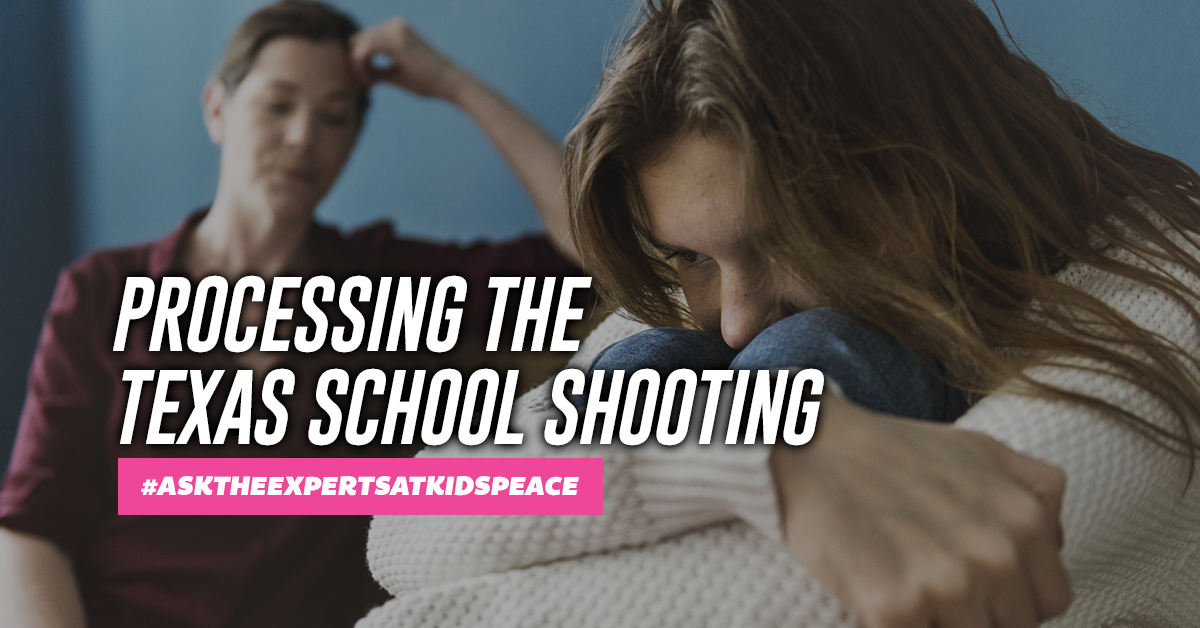
We asked therapist Jodi S.W. Whitcomb, M.S., for advice for parents who are concerned about their children’s reaction to the elementary school shooting in Texas that dominates the news coverage in the U.S. at this time:
When these kinds of events occur, it is difficult for anyone to process and make sense of it. People (both youth and adults) may feel a mixture of emotions and be confused by their thoughts and feelings about what is happening in the world. At KidsPeace, we have had experience with helping youth cope in the wake of these kinds of traumatic events as they unfold.
We often remind people that you are “a normal person reacting to an abnormal event” so that we can help them realize that their reactions are not weird or shocking. Their reactions are typical for a normal person.
These normal reactions to abnormal events include:
- Sleep and/or eating problems
- Sadness, tearfulness
- Fear, anxiety, worry
- Irritability, anger
- Nightmares
- Headaches, upset stomach
- Trouble focusing, feeling “numb” or “fuzzy”
- Not wanting to engage in normal activities, such as going to school
- Not wanting to leave their “comfort zone” (with whomever or wherever that is)
- Being “okay” at first but then “breaking down” unexpectedly
- Wanting to avoid the situation or talk about the situation
It is normal for these symptoms to persist for a few weeks. After that point, they will probably subside a little bit at a time. But every child and every adult is different. It may take a little longer for some or less time for others. The hope is that over a few weeks’ time that symptoms will slowly improve with support. If they do not, or if they get worse, it’s time to turn to a professional for help. This may be a family doctor or pediatrician, school counselor, therapist or services provided through a walk-in center or EAP program at work.
Typically speaking, individuals who are geographically closer to the events, or in some way emotionally connected to the event, will have a stronger reaction than others. HOWEVER, the media brings everyone a lot closer together. People who live in other states, for instance, may feel stronger effects of the trauma because they are seeing real events replayed over and over or a realistic representation of it on TV, or through the Internet.
Parents should not underestimate the power of vicarious traumatization, which is to be traumatized by watching something, looking at pictures, or by listening to the telling of a story over and over. It may seem like an event isn’t connected to you or your child but remember that events involving loss activate memories of loss in other areas of your life and can cause a reaction.
Also, it’s important to note that anything a person views in the media that strikes a chord for them personally, due to a past event or a personal concern/issue, can trigger negative thoughts or emotions. This is called a trauma response and should not be minimized or ignored.
What parents can say and do to help:
- Limit exposure to media relating to the events.
- Talk to your child about what happened, but only give them information they do need that is age-appropriate.
- Let your child be your guide. Answer what they ask and nothing more. (Example: “Mom, did anyone get hurt?” “Yes, it’s sad, but some people did get hurt.” It’s not necessary to give the details.)
- Listen to what they have to say. Let them talk. Validate their emotions.
- Be tolerant and understanding of worry, fear, sadness and anger. Be prepared to deal with these emotions and remind yourself that they are normal responses given the circumstances.
- Do whatever you can to make your child feel safe and secure. Be understanding that especially in this case there may be children who do not feel safe going to school right away. This will be something you’ll need to work out on a day-by-day basis.
- Take care of yourself. As parents, we can’t help our children if we aren’t taking care of our own needs.
In addition to seeing the family doctor you may want to check out some other resources for you or your child. One of these resources is KidsPeace’s TeenCentral.com service. TeenCentral is an anonymous website that young people can write their stories and get a response from a mental health professional within a very short period of time. The website also offers a lot of psychoeducation on many topics. When you’re not sure where to turn or you’re waiting for services, TeenCentral may be a good option in the meantime.



